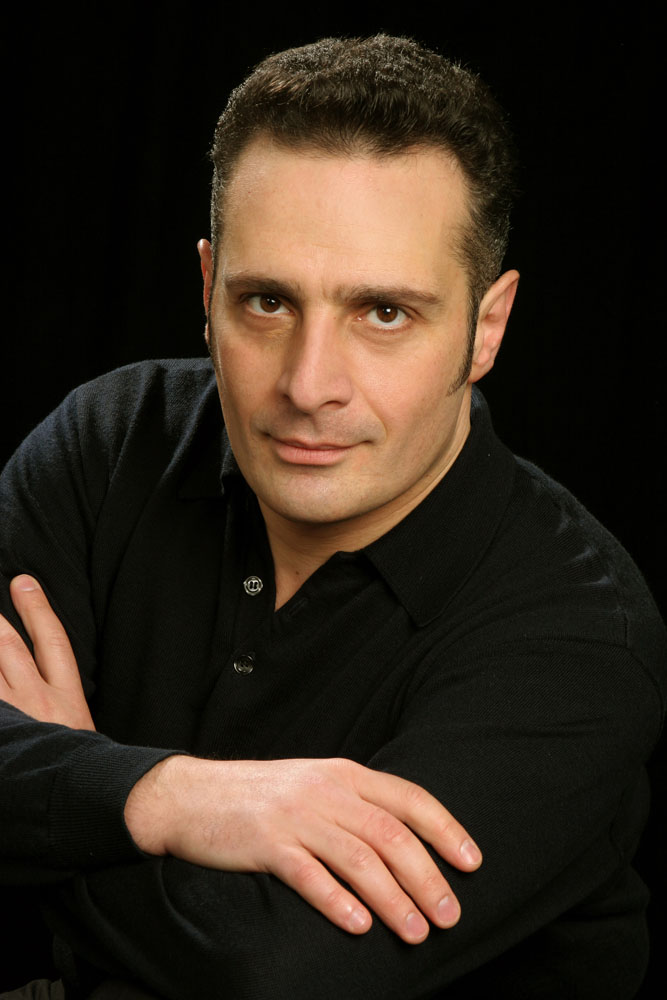BARITON
The Armenian-born baritone Mikael Babajanyan completed his vocal and conducting studies at the Yerevan Komitas State Conservatory with outstanding results, and won several national singing competitions. At the Komitas State Conservatory, he was taught by the famous voice professor Arax Davtian. Later he continued his vocal studies in Germany with Tom Krause, Kurt Moll and Kàroly Szilàgyi.
From 1997 to 1999, he conducted the orchestra of the Armenian National Opera Theatre of Yerevan and has sung often times as a soloist at the Armenian Philarmonic Orchestra, where he performed the Fauré Requiem, the Brahms Requiem, the Mozart Requiem and Rossini's Stabat Mater.
Since 1999 Mikael Babajanyan lives in Germany. His first engagements took him to the theatres of Koblenz, Bielefeld and Giessen, where he performed roles such as Sharpless/Madama Butterfly and Dandini/La Cenerentola. At the State Opera Hanover he performed as Allazim in Mozart's Zaide. Further guest performances lead him to the Grand Théâtre de la Ville in Luxemburg, the Baden State Theatre in Karlsruhe and Bremen Theatre.
From 2002 to 2005 he was a member of the ensemble at Dortmund Theatre, where he sang Belcore/L'elisir d'amore, the title role of Don
Giovanni, Faninal/Der Rosenkavalier, Fernando/Fidelio, Il Conte/Le Nozze di Figaro, Guglielmo/Così fan tutte, Onegin/Eugen Onegin, Schaunard/La Bohème and Sharpless. He also performed regularly at the Mecklenburg State Theatre in Schwerin as Marcello in La Bohème, Ford in Falstaff and Don Giovanni.
By the 2004/2005 season, Mikael Babajanyan has become a highly acclaimed dramatic baritone. A major breakthrough was his much praised debut in 2006/2007 as Iago in Otello at the Bonn Opera, where he gave a year later another successful debut as Yeletzky in Pique Dame. Enthusiastically received by the press and audiences was also his debut as Francesco in Verdi's I Masnadieri in Munich at Gärtnerplatz Theatre and as Amonasro in Aida at the Savonlinna Opera Festival in Finland (both in 2007/2008). Two years later, he was back at the Savonlinna Opera Festival as Sharpless.
Further guest engagements took him to several foreign opera houses such as the New National Theatre in Tokyo/Japan (Iago), Opera Hong Kong (Germont/La Traviata) and Opéra de Dijon/France (Amonasro/Aida). At the Opéra de Lyon in France he debuted as Drebednyov in Shostakovitch's only operetta Moscow, Cheryomushki. In The Netherlands he performed with the Nederlandse Reisopera in Utrecht (Renato/Un Ballo in Maschera) and in The Hague at the Festival Classique (Alfio//Cavalleria Rusticana). His Austrian debut he made as Vincenzo Gellner in Catalani's opera La Wally at the Klagenfurt City Theatre, where he also performed as Conte di Luna in Il Trovatore.
From 2009 to 2013 the baritone was a member of the ensemble at the Aalto Theatre Essen, where he appeared as Amonasro, Belcore, Francesco, Germont, Marcello, Onegin, Renato, Scarpia/Tosca and Sharpless.
Besides his regular appearances at the Mecklenburgian State Theatre and Castle Opera Festival in Schwerin (Renato, Rigoletto, Scarpia, Germont, Conte di Luna, Tonio/Pagliacci), he had performances at Bielefeld Theatre (Amonasro, Alfio, Tonio), Cologne Opera ( Germont), Frankfurt Opera (Francesco), Halle Opera (Yeletzky), Pfalz Theatre Kaiserslautern (Conte di Luna ), Krefeld and Mönchengladbach City Theatre (Amonasro, Scarpia, Yeletzky), Leipzig Opera (Onegin), National Theatre Mannheim (Marcello, Scarpia) and State Theatre Saarbrücken (Germont).
His concert engagements have included the Bartok+Mozart Opera Festival in Miskolc (Hungary), and under Helmuth Rilling he has sung the Messa per Rossini in Stuttgart, at the Rheingau Musik Festival and at the Oregon Bach Festival.
Mikael Babajanyan has also been a regular guest in his homeland. With the Armenian Philarmonic Orchestra he has performed as Figaro and the title roles of Simon Boccanegra and Rigoletto at the Aram Khatchaturian Grand Concert Hall of Yerevan. Furthermore, he has sung in 2017 with the Armenian National Opera and Ballet Theatre the title role of Davit in Haro Stepanyan's opera Sasuntsi Davit in Shushi and Yerevan. In the last two years he has sung several concerts at the Armenian National Opera and Ballet Theatre in Yerevan and performed as Scarpia again. In 2019 he has also conducted there several concerts and operas such as Un Ballo in Maschera and Rossini's Il viaggio a Reims which he also stage-managed. In 2019 he got appointed as the Deputy Artistic Director of the Armenian National Opera and Ballet Theatre.
Operatic Repertoire
Beethoven Catalani Cavalli Donizetti Gluck Gounod Leoncavallo Lortzing Mascagni
Mozart Fidelio La Wally L'Ormindo
L'elisir d'amore Armide
Faust
Pagliacci
Der Wildschütz Cavalleria Rusticana Così fan tutte Fernando Vincenzo Gellner Amida
Belcore Hidraot Valentin Tonio
Count von Eberbach Alfio
Guglielmo
Don Giovanni
Le Nozze di Figaro Don Giovanni Conte di Almaviva
Zaide Allazim
Puccini La Bohème Madama Butterfly Marcello, Schaunard Sharpless
Tosca Scarpia
Rossini Il Barbiere di Siviglia La Cenerentola Figaro Dandini
Il viaggio a Reims Don Alvaro
Strauss Ariadne auf Naxos Der Rosenkavalier Harlekin Faninal
Shostakovitch Moscow, Cheryomushki Drebednyov
Stepanyan Sasuntsi Davit Davit
Tchaikovsky Eugen Onegin Onegin
Pique Dame Count Yeletzky
Verdi Aida
Un ballo in maschera Amonasro Renato
Falstaff
I Masnadieri Ford Francesco
Nabucco Otello Nabucco Iago
Rigoletto
Simon Boccanegra Rigoletto
Simon Boccanegra
La Traviata Il Trovatore Giorgio Germont Conte di Luna
Wagner Die Meistersinger von Nürnberg Konrad Nachtigall
Das Rheingold Donner
Concert and Oratorio Repertoire
Beethoven Symphony No. 9
Brahms Deutsches Requiem
Fauré Requiem
Mendelssohn Walpurgisnacht
Orff Carmina Burana
Rossini Stabat Mater
Verdi & others Messa per Rossini
Extract of Press Reviews
Renato in Un ballo in maschera
Also Mikael Babajanyan satisfies straightaway with a wonderful smooth baritone which indicates also ample „blackness“ and „metal“ for his upcoming Scarpia in Puccini's „Tosca“.
--Westdeutsche Allgemeine Zeitung, 14. September 2009
Marcello in La Bohème
Among the singers Mikael Babajanyan was especially impressive. He sang with great vocal elegance a splendiferous Marcello.
--Der neue Merker, März 2009, Ludwig Steinbach
Gellner in La Wally
Mikael Babajanyan in the role of the unhappy Gellner proves to be an equal partner who is addicted to Wally in self-destructive fervor. The Armenian impressed with a masculine baritone and intense acting.
--Opernglas, November 2008
Francesco Moor in I Masnadieri
As Francesco Moor, Mikael Babajanyan gave a performance that should automatically catapult him into the first tier of Verdi interpreters. His voluminous baritone voice knew no limits, whether in terms of interpretation or of cantilena singing. Here is certainly a singer to be watched!"
--Opera News Online, March 2008, Jeffrey Leipsic
Giorgio Germont in La Traviata
You hardly ever experience a Giorgio Germont as Mikael Babajanyan sang him. Drawing on abundant vocal sources, with dramatic aplomb, but differentiating all the same, he achieved a brilliant performance.
--Opernglas, Nov 2007, K-F Schulte
Iago in Otello
Mikael Babajanyan (Iago) surprises from the first tone: a noble-baritone with suppleness, impact and stream; especially impressive in the dream narration.
--Kölner Stadt-Anzeiger, June 2007, Gerhard Bauer
Fact is that the Iago analysis of the prominent Belcanto-Baritone Mikael Babajanyan in Bonn can already move confidently and self-confident in the opera-olympus of dazzling outstanding villians. The musical conversion succeeds right as rain, perfect in form and still equipped with more extreme, always slight expressivity – altogether a distressing realistic and oppressive character sketch.
--Opernglas, August 2007, B. Kempen Iago is an exquisite theatre sod – sleeky, glibly, diabolical abominable; his Credo does not
drone and therefore it appears the more dangerous. Mikael Babajanyan sings and plays it terrifically.
--Frankfurter Allgemeine Zeitung, June 2007, Gerhard Rohde
Mikael Babajanyan makes a terrific role debut. The Armenian Baritone has the required vocal power - his nihilistic “Credo” almost appears frightening - if necessary, he knows how to direct his voice with balmy beauty.
--General-Anzeiger Bonn, June 2007, Bernhard Hartmann
Perhaps the character study would have to be arranged beyond it, to which Mikael Babajanyan tenders his Iago - a psycho in uniform. The Armenian is extreme in everything, also vocally - his variability is enormous. His revenge duet with Otello turned out grand, furthermore the complex choir - soloist - scene in the third act had been very impressive. Great Applause!
--Kölnische Rundschau, June 2007, H. D. Terschüren
Scarpia in Tosca
Match winner of the evening and a real impact was Mikael Babajanyan as Scarpia. The Baritone savoured completely his role from the first to the last minute and bestowed his audience continuously with striking moments.
--Opernglas, March 2007, Söhnke Mertens Mikael Babajanyan, to whom the black uniform gives a marvellous consistently appearance
with his black hair and his gimlet black eyes, plays the Scarpia with an unobtrusive trickiness, who abruptly turns from soft features to abysmally fiendishness. Avoiding overstatements he forms his character with a psychological sharp eye and due to that achieving an absorbing impression. And all this with a voice, which is capturing in a tempting manner and suggesting humanity.
--Schweriner Volkszeitung, Jan 2007, Michael Baumgartl
The Scarpia of Mikael Babajanyan was minted by self-control and elegance, he lifts his slight Baritone confidently over the orchestra masses.
--Opernglas, Jan 2007, B. Kempen
Mikael Babajanyan as Scarpia is a brutal person right out of the picture book, his singing is a permanent volcanic eruption. A vocal physically complete and an absolute possessive portrait.
--Theater pur, Jan 2007, Christoph Zimmermann
 |

